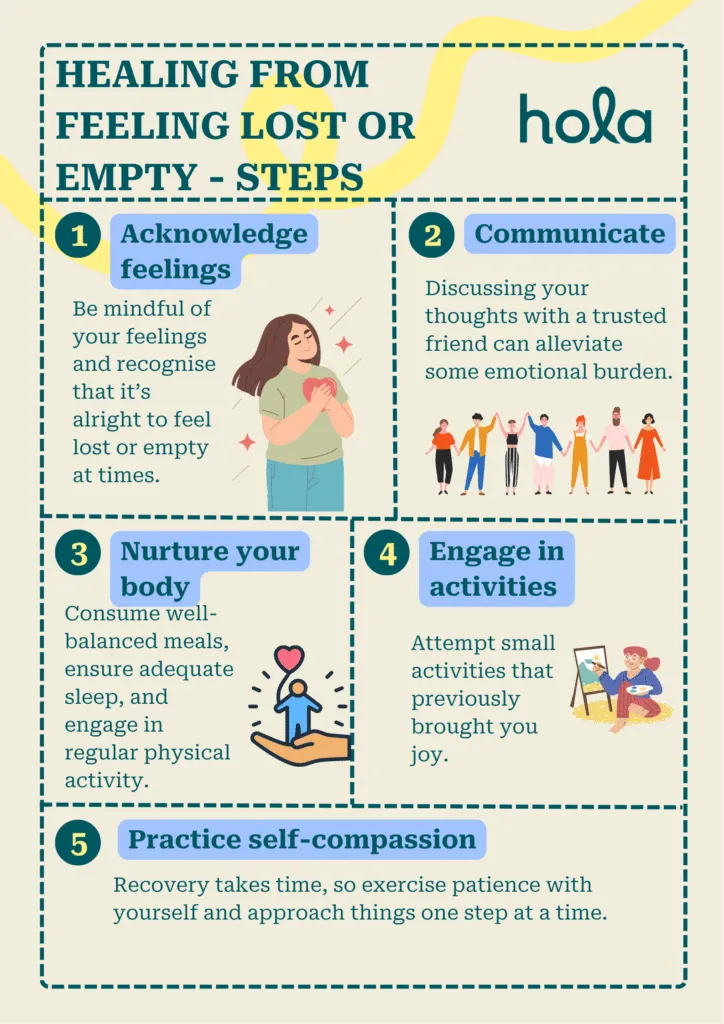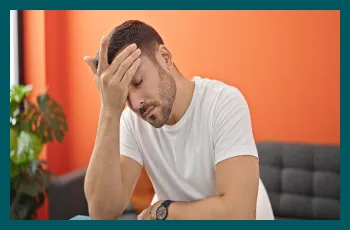Feeling empty & lost inside: What it means?
Written by editorial staff writer at Hola. Medically reviewed by Amira Shah, MA in Counselling Psychology, Registered Psychotherapist.

Contents

Summary: Feeling empty and lost inside often signals a deeper need to pause, heal, and reconnect with what truly matters. It’s a common human experience, not a defect. With care, curiosity, and patience, this phase can become a turning point toward growth, meaning, and a deeper understanding of who you are.
Ever had a moment when you’re surrounded by people, maybe even laughing, yet feeling nothing inside? Like there’s a quiet hollowness inside that you can’t quite define? It’s as if your inner compass has stopped working, you are going through the motions, but unsure of the direction or purpose. Don’t worry, you’re not broken. This strange, hard-to-explain emptiness, the sense of being off-track, even though you’re doing what you’re supposed to, is something many people experience. It’s life’s gentle way of prompting us, asking us to pause, reflect, and maybe start a deeper conversation with ourselves. So, let’s dive into what this feeling means and what it’s trying to tell you.
Briefly describe the experience of feeling empty or emotionally lost.
Feeling emotionally lost or empty often manifests as a profound numbness or sense of disconnection from oneself, others, and the surrounding world. It can feel as if you’re merely going through the motions without truly engaging or experiencing feelings internally. Activities that used to bring happiness may now seem unfulfilling, and articulating the reasons behind this can be challenging. You might experience feelings of being trapped, alone, or unnoticed, uncertain about what’s amiss or how to regain a sense of wholeness.What does “feeling empty” actually mean?
“Feeling empty” refers to a profound sense of internal void or emotional numbness. It signifies a lack of strong emotions, whether happiness, sadness, excitement, or connection. Individuals experiencing emptiness often characterise it as a hollowness within, a disconnection from themselves and others, or a sense that something vital is absent. This condition can be associated with unresolved emotional distress, depression, trauma, or significant life changes, indicating a potential need for introspection or support from a mental health professional.Common causes of feeling empty or lost
Several common factors can contribute to feelings of emptiness or being lost:- Depression: A significant factor that often leads to emotional numbness, hopelessness, and a diminished interest in life.
- Grief or trauma: The loss of someone close or past emotional injuries can result in a persistent sense of emptiness.
- Lack of purpose or direction: Feeling unfulfilled in work, relationships, or life overall can create a sensation of being adrift.
- Loneliness and isolation: A disconnection from others may lead to feelings of invisibility or emotional detachment.
- Burnout: Chronic stress from work or caregiving responsibilities can leave one feeling mentally and emotionally exhausted.
- Unprocessed emotions: Continually suppressing feelings rather than expressing them can cultivate emotional numbness over time.
Ready for positive change? Start your mental health care plan here.
Book an appointment
Fully bulk-billed, across Australia.
Why do I feel empty inside?
Experiencing emptiness within can stem from various factors. It could be related to emotional fatigue, isolation, depression, or a disconnection from oneself or others. Sometimes, it arises from unresolved grief, trauma, or unmet emotional needs. You might feel as if you’re merely coasting through life, devoid of joy, purpose, or satisfaction. This sensation is more prevalent than many assume, and it serves as an indication that your mind and heart may require attention, care, and possibly the intervention of a mental health professional.How body & mind connected with each other
The body and mind are deeply interconnected through a complex system of nerves, hormones, and chemical signals. When experiencing stress, your body reacts physically. Likewise, physical ailments like chronic pain or illness can adversely influence your mood and mental health, potentially resulting in anxiety or depression. Thoughts and emotions impact brain chemistry, subsequently affecting sleep, energy levels, and immune function. Caring for your mental state promotes physical health, and vice versa.What are the steps toward healing
Steps toward recovery can be straightforward and gentle. Begin by acknowledging your emotions and accepting that it’s normal not to feel okay:- Acknowledge your feelings: Be mindful of your feelings and recognise that it’s alright to feel lost or empty at times.
- Communicate with others: Discussing your thoughts with a trusted friend or a mental health professional can alleviate some emotional burden.
- Nurture your body: Consuming well-balanced meals, ensuring adequate sleep, and engaging in regular physical activity contribute to both physical and mental well-being.
- Engage in enjoyable activities: Attempt small activities that previously brought you joy, even if they don’t yield the same feelings immediately.
- Practice self-compassion: Recovery takes time, so exercise patience with yourself and approach things one step at a time.

What are the medications and therapy options
Medications and therapeutic methods for feelings of emotional emptiness, depression, or related mental health issues differ according to individual requirements, but here are some common strategies:Medications:
Doctors may recommend antidepressants to assist in regulating brain chemicals associated with mood, motivation, and emotional health. These are frequently prescribed when symptoms are ongoing or disrupt daily functioning.Therapeutic methods:
- Cognitive Behavioural Therapy (CBT) aids in recognising and altering negative thought processes.
- Talk therapy or counselling provides a supportive environment to delve into emotions and past experiences.
- Mindfulness-based therapy can help manage your emotions and remain in the moment.
- Trauma-focused therapy is beneficial if your emotions arise from unresolved trauma or past situations.
How telehealth makes it easier to get support anytime
Telehealth facilitates access to support whenever needed by enabling you to connect with doctors or therapists from anywhere via your phone or computer. Mental Health Treatment Plans allow you to utilise funded online consultations, rendering care more affordable and accessible. You are not required to travel or experience extended delays when scheduling telehealth appointment, which is particularly advantageous if you have a hectic schedule or reside far from clinics. Telehealth provides privacy and comfort, enabling you to converse openly from your environment, thus offering prompt access to guidance, treatment, or prescriptions whenever necessary.Conclusion:
Feeling empty and lost isn’t the end of the road; it’s a subtle sign that something within you is ready to evolve. It’s alright not to have all the answers right now. Take small steps, stay curious, and believe that even in the silence, you’re growing into something real and beautiful.FAQs
Is it normal to feel empty or lost sometimes?
Yes, these feelings are natural. Many people go through these emotions throughout life, especially in moments of transition, stress, or self-discovery. It’s a sign to pause, reflect, and reconnect with yourself.Can feeling emotionally empty be a sign of depression?
Yes, emotional emptiness can be a sign of depression. It’s often accompanied by low energy, loss of interest, and feeling disconnected from yourself or others. If these feelings continue, getting support from a therapist or mental health professional can help.Can I get a medical certificate for mental health reasons, like burnout or emotional exhaustion?
Yes, you can. A qualified doctor or mental health expert can issue a medical certificate for issues like burnout, emotional fatigue, or other mental health conditions, especially when they impact your daily functioning or job performance. Always speak with a healthcare provider for proper guidance and documentation.How does telehealth help with mental health support?
Telehealth improves access to mental health care by allowing you to connect with therapists, counsellors, or doctors from home. It’s convenient, flexible, confidential, and often easier to fit into your schedule, especially beneficial for individuals coping with anxiety, burnout, or emotional exhaustion.What should I do if nothing brings me joy anymore?
This can be a sign of something deeper, like depression or emotional exhaustion. Speaking with a mental health expert is a great first step, they can help you understand what’s going on and guide you toward healing. Even simple changes, like adjusting your daily habits or confiding in someone you trust, can start to ease the weight. You’re not alone.Can emotional stress cause physical symptoms?
Yes, emotional stress can manifest physically, causing symptoms like fatigue, headaches, muscle tension, stomach problems, and sleep disruptions. Over time, chronic stress can weaken your immune system and impact your overall well-being. Practising self-care, getting professional support, and using relaxing strategies can ease the effects.Is it okay to ask for help even if I don’t know what’s wrong?
Yes, definitely. You don’t need to have all the answers to seek support. Feeling low, overwhelmed, or simply “not yourself” is reason enough to ask for help. Mental health professionals are trained to guide you, even when things feel hard to explain.Take control of your mental health. Begin your care plan now.
Book an appointment
Fully bulk-billed, across Australia.
What we treat
- Cough
- Nausea & vomiting
- Fever
- Hayfever
- Fatigue
- Sore throat
- Acne
- Hair loss
- Gout
- Eczema
- Rosacea
- Sunburn
- UTI
- Erectile dysfunction
- Contraception
- Morning sickness
- Morning after pill
- Prostate health
- Anxiety
- Depression
- Stress
- Grief & loss
- Antidepressants
- Premature ejaculation
- Asthma
- Blood pressure
- Blood thinners
- Diabetes
- Cholesterol
- Migraines & headaches
- Allergies
- Body ache
- Heartburn & reflux
- Sleep disorder
- Pain relief
- Gastro
Related Articles
What Is Online Therapy? Everything You Need To Know About e-Therapy
February 19, 2026Mental Health
...
Disclaimer
This blog is for general informational purposes only and does not indicate that Hola Health provides all treatments or preventive measures mentioned. It is not intended to be a substitute for professional medical advice. Always seek the guidance of your doctor or other qualified health professional with any questions you may have regarding your health or a medical condition. For emergencies please immediately contact 000. Any medical topics discussed are intended to educate, not to imply availability through Hola Health.
 Facebook
Facebook  X
X  Copy Link
Copy Link



